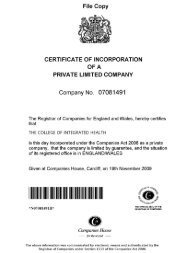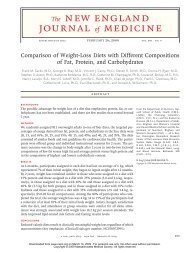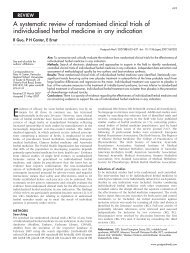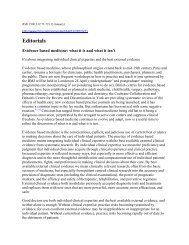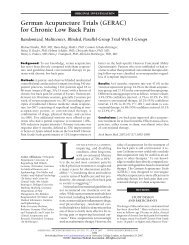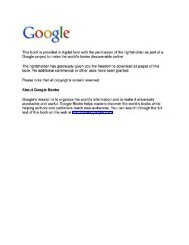- Page 5 and 6: Evidence Check 2: Homeopathy 1Conte
- Page 7 and 8: Evidence Check 2: Homeopathy 31 Int
- Page 9 and 10: Evidence Check 2: Homeopathy 52 NHS
- Page 11 and 12: Evidence Check 2: Homeopathy 7Scien
- Page 13 and 14: Evidence Check 2: Homeopathy 9• a
- Page 15 and 16: Evidence Check 2: Homeopathy 11•
- Page 17 and 18: Evidence Check 2: Homeopathy 13We h
- Page 19 and 20: Evidence Check 2: Homeopathy 15Like
- Page 21 and 22: Evidence Check 2: Homeopathy 17wate
- Page 23 and 24: Evidence Check 2: Homeopathy 1968.
- Page 25 and 26: Evidence Check 2: Homeopathy 21Ther
- Page 27: Evidence Check 2: Homeopathy 23fund
- Page 31 and 32: Evidence Check 2: Homeopathy 27It w
- Page 33 and 34: Evidence Check 2: Homeopathy 29plac
- Page 35 and 36: Evidence Check 2: Homeopathy 31and
- Page 37 and 38: Evidence Check 2: Homeopathy 33Our
- Page 39 and 40: Evidence Check 2: Homeopathy 35The
- Page 41 and 42: Evidence Check 2: Homeopathy 37137.
- Page 43 and 44: Evidence Check 2: Homeopathy 39143.
- Page 45 and 46: Evidence Check 2: Homeopathy 41151.
- Page 47 and 48: Evidence Check 2: Homeopathy 43Conc
- Page 49 and 50: Evidence Check 2: Homeopathy 45not
- Page 51 and 52: Evidence Check 2: Homeopathy 47Over
- Page 53 and 54: Evidence Check 2: Homeopathy 49Para
- Page 55 and 56: Evidence Check 2: Homeopathy 51Witn
- Page 57 and 58: Evidence Check 2: Homeopathy 53List
- Page 59 and 60: Evidence Check 2: Homeopathy 55Sess
- Page 61 and 62: Ev 2Science and Technology Committe
- Page 63 and 64: Ev 4Science and Technology Committe
- Page 65 and 66: Ev 6Science and Technology Committe
- Page 67 and 68: Ev 8Science and Technology Committe
- Page 69 and 70: Ev 10Science and Technology Committ
- Page 71 and 72: Ev 12Science and Technology Committ
- Page 73 and 74: Ev 14Science and Technology Committ
- Page 75 and 76: Ev 16Science and Technology Committ
- Page 77 and 78: Ev 18Science and Technology Committ
- Page 79 and 80:
Ev 20Science and Technology Committ
- Page 81 and 82:
Ev 22Science and Technology Committ
- Page 83 and 84:
Ev 24Science and Technology Committ
- Page 85 and 86:
Ev 26Science and Technology Committ
- Page 87 and 88:
Ev 28Science and Technology Committ
- Page 89 and 90:
Ev 30Science and Technology Committ
- Page 91 and 92:
Ev 32Science and Technology Committ
- Page 93 and 94:
Ev 34Science and Technology Committ
- Page 95 and 96:
Ev 36Science and Technology Committ
- Page 97 and 98:
Ev 38Science and Technology Committ
- Page 99 and 100:
Ev 40Science and Technology Committ
- Page 101 and 102:
Ev 42Science and Technology Committ
- Page 103 and 104:
Ev 44Science and Technology Committ
- Page 105 and 106:
Ev 46Science and Technology Committ
- Page 107 and 108:
Ev 48Science and Technology Committ
- Page 109 and 110:
Ev 50Science and Technology Committ
- Page 111 and 112:
Ev 52Science and Technology Committ
- Page 113 and 114:
Ev 54Science and Technology Committ
- Page 115 and 116:
Ev 56Science and Technology Committ
- Page 117 and 118:
Ev 58Science and Technology Committ
- Page 119 and 120:
Ev 60Science and Technology Committ
- Page 121 and 122:
Ev 62Science and Technology Committ
- Page 123 and 124:
Ev 64Science and Technology Committ
- Page 125 and 126:
Ev 66Science and Technology Committ
- Page 127 and 128:
Ev 68Science and Technology Committ
- Page 129 and 130:
Ev 70Science and Technology Committ
- Page 131 and 132:
Ev 72Science and Technology Committ
- Page 133 and 134:
Ev 74Science and Technology Committ
- Page 135 and 136:
Ev 76Science and Technology Committ
- Page 137 and 138:
Ev 78Science and Technology Committ
- Page 139 and 140:
Ev 80Science and Technology Committ
- Page 141 and 142:
Ev 82Science and Technology Committ
- Page 143 and 144:
Ev 84Science and Technology Committ
- Page 145 and 146:
Ev 86Science and Technology Committ
- Page 147 and 148:
Ev 88Science and Technology Committ
- Page 149 and 150:
Ev 90Science and Technology Committ
- Page 151 and 152:
Ev 92Science and Technology Committ
- Page 153 and 154:
Ev 94Science and Technology Committ
- Page 155 and 156:
Ev 96Science and Technology Committ
- Page 157 and 158:
Ev 98Science and Technology Committ
- Page 159 and 160:
Ev 100Science and Technology Commit
- Page 161 and 162:
Ev 102Science and Technology Commit
- Page 163 and 164:
Ev 104Science and Technology Commit
- Page 165 and 166:
Ev 106Science and Technology Commit
- Page 167 and 168:
Ev 108Science and Technology Commit
- Page 169 and 170:
Ev 110Science and Technology Commit
- Page 171 and 172:
Ev 112Science and Technology Commit
- Page 173 and 174:
Ev 114Science and Technology Commit
- Page 175 and 176:
Ev 116Science and Technology Commit
- Page 177 and 178:
Ev 118Science and Technology Commit
- Page 179 and 180:
Ev 120Science and Technology Commit
- Page 181 and 182:
Ev 122Science and Technology Commit
- Page 183 and 184:
Ev 124Science and Technology Commit
- Page 185 and 186:
Ev 126Science and Technology Commit
- Page 187 and 188:
Ev 128Science and Technology Commit
- Page 189 and 190:
Ev 130Science and Technology Commit
- Page 191 and 192:
Ev 132Science and Technology Commit
- Page 193 and 194:
Ev 134Science and Technology Commit
- Page 195 and 196:
Ev 136Science and Technology Commit
- Page 197 and 198:
Ev 138Science and Technology Commit
- Page 199 and 200:
Ev 140Science and Technology Commit
- Page 201 and 202:
Ev 142Science and Technology Commit
- Page 203 and 204:
Ev 144Science and Technology Commit
- Page 205 and 206:
Ev 146Science and Technology Commit
- Page 207 and 208:
Ev 148Science and Technology Commit
- Page 209 and 210:
Ev 150Science and Technology Commit
- Page 211 and 212:
Ev 152Science and Technology Commit
- Page 213 and 214:
Ev 154Science and Technology Commit
- Page 215 and 216:
Ev 156Science and Technology Commit
- Page 217 and 218:
Ev 158Science and Technology Commit
- Page 219 and 220:
Ev 160Science and Technology Commit
- Page 221 and 222:
Ev 162Science and Technology Commit
- Page 223 and 224:
Ev 164Science and Technology Commit
- Page 225 and 226:
Ev 166Science and Technology Commit
- Page 227 and 228:
Ev 168Science and Technology Commit
- Page 229 and 230:
Ev 170Science and Technology Commit
- Page 231 and 232:
Ev 172Science and Technology Commit
- Page 233 and 234:
Ev 174Science and Technology Commit
- Page 235 and 236:
Ev 176Science and Technology Commit
- Page 237 and 238:
Ev 178Science and Technology Commit
- Page 239 and 240:
Ev 180Science and Technology Commit
- Page 241 and 242:
Ev 182Science and Technology Commit
- Page 243 and 244:
Ev 184Science and Technology Commit
- Page 245 and 246:
Ev 186Science and Technology Commit
- Page 247 and 248:
Ev 188Science and Technology Commit
- Page 249 and 250:
Ev 190Science and Technology Commit
- Page 251 and 252:
Ev 192Science and Technology Commit
- Page 253 and 254:
Ev 194Science and Technology Commit
- Page 255 and 256:
Ev 196Science and Technology Commit
- Page 257 and 258:
Ev 198Science and Technology Commit
- Page 259 and 260:
Ev 200Science and Technology Commit
- Page 261 and 262:
Ev 202Science and Technology Commit
- Page 263 and 264:
Ev 204Science and Technology Commit
- Page 265 and 266:
Ev 206Science and Technology Commit
- Page 267 and 268:
Ev 208Science and Technology Commit
- Page 269 and 270:
Ev 210Science and Technology Commit
- Page 271 and 272:
Ev 212Science and Technology Commit
- Page 273 and 274:
Ev 214Science and Technology Commit
- Page 275:
Ev 216Science and Technology Commit




